The Ultimate Guide to Trampoline Park Business Licenses and Permits in the USA
It might be an exciting opportunity to start a trampoline business in the United States. You can offer ninja courses, playground equipment, entertaining family activities, or soft play spaces for small children. You should research the intricate regulations and permits involved in operating a trampoline park before you succeed.
To operate a commercial indoor playground, family entertainment center (FEC), or sports arena attraction legally, you must be aware of the licenses you require and adhere to safety regulations, zoning laws, and other requirements. This guide explains what you want to know and how Dreamland assists customers in this process.
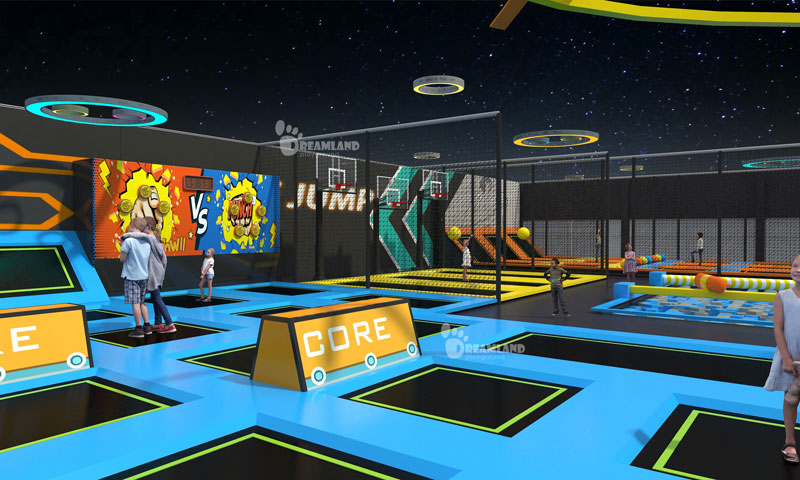
Why Are Licenses and Permits Important for Trampoline Parks?
You risk fines, closure, or other legal issues if you operate without the required trampoline stop work permit or permits. Trampolines are subject to local government regulations to ensure public safety and proper placement. Obtaining the necessary permissions demonstrates that you are complying with the laws and construction regulations. By doing this, you and your supporters can stay secure. Additionally, obtaining the appropriate business licenses for trampoline parks in the USA safeguards your company and helps you win over investors and partners.
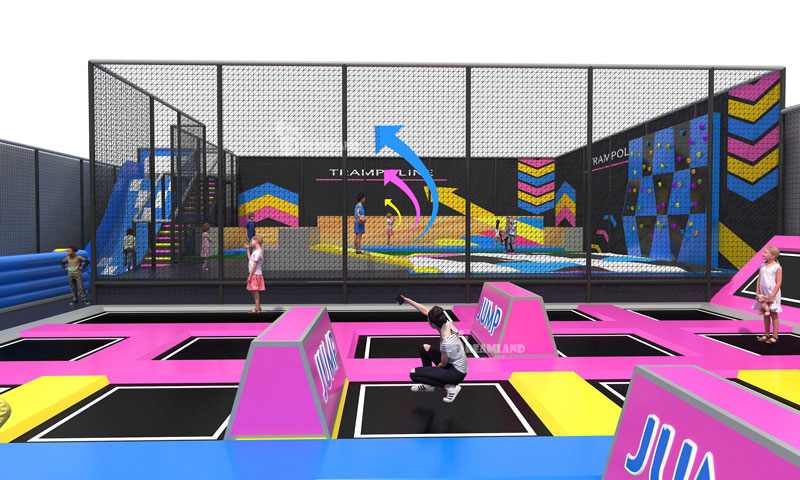
Types of Licenses and Permits Needed for a Trampoline Park
1. General Business License (Trampoline Park Operating License)
Understanding and obtaining the appropriate licenses and permits is a crucial step when launching a trampoline business in the United States. These crucial guidelines ensure that your trampoline park is secure, complies with state and local regulations, and stays clear of expensive fines or delays.
A fundamental business license, often known as a trampoline establishment permission, is one of the most important requirements. You can lawfully operate your business in the city or region where you are located thanks to this permit. It is frequently the primary document required to obtain all business permits for trampolines.
What's Required:
- Business name registration
- Business address
- Ownership structure (LLC, Corporation, etc.)
- EIN (Employer Identification Number)
- Filing fees
2. Zoning and Land Use Permit
Verifying that your neighborhood's trampoline zoning laws are being observed is the next step. Not every property is suitable for indoor play spaces for leisure or commercial purposes. You must confirm that the site is properly zoned.
If not, you might have to apply for a zoning change or special permit. Zoning regulations typically address issues like noise levels, traffic flow, safety, and the proximity of locations to residences or schools. This must be done correctly. Breaking the regulations could cause issues with relocation or delay your opening.
What to Consider:
- Commercial zoning compliance
- Parking availability
- Noise ordinances
- Traffic flow and safety
3. Building and Construction Permits
You must obtain building permits from your local government if you are remodeling an existing office or constructing a new one. These consist of funds for plumbing, heating, and conditioning installation, electrical system maintenance, and fire safety improvements.
City officials will inspect the property after the development is complete to ensure that it complies with all building rules and trampoline safety standards. These assessments are crucial since noncompliance could necessitate costly adjustments prior to opening. You will receive a Certificate of Citizenship once all the inspections are complete, attesting to the building's safety.
Includes Permits For:
- Structural modifications
- Electrical installations
- HVAC systems
- Plumbing work
- Fire sprinklers and emergency lighting
4. Fire Department Approval / Fire Safety Certificate
To obtain a Fire Safety Certificate, you must pass a fire safety inspection in addition to obtaining building licenses. Fire officials will inspect your trampoline area for obvious signage, sprinkler systems, fire extinguishers, alarm systems, and emergency exits.
Fire safety is a major concern because trampoline parks may get extremely crowded. It is critical to have safety precautions for assembling trampolines in place at this point in order to adhere to regulations and ensure the long-term safety of your guests and employees.
What Fire Marshals Look For:
- Clear exits and marked pathways
- Fire alarms and sprinkler systems
- Emergency lighting and signage
- Fire extinguishers and access to hydrants
5. Health Department Permits (If Food Is Served)
You will require additional permissions from your local health authority if your trampoline park serves food or beverages, such as through a café or snack bar. This covers medical examinations, food safety education, and following hygienic guidelines.
If regulations are disregarded once operations have begun, noncompliance may result in postponed openings or even permanent closures. While not all trampoline parks provide meals, those that do must adhere to regional health regulations regarding food safety and cleanliness.
Permits May Include:
- Food Service License
- Health and Sanitation Permit
- Food handler’s certification for employees
Health Department Inspections Cover:
- Food storage, prep, and handling
- Handwashing stations
- Pest control
- Waste disposal
6. Amusement Device or Attraction License (State‑Specific)
You might also need to obtain a hunting or fishing license, depending on where you live. Trampoline parks, ninja courses, climbing walls, and other entertaining indoor playground equipment are typically covered by these licenses. Certain rules in states like California, New York, and Pennsylvania govern the operations of these offices and ensure their security.
Building yield certificates must be made, yearly inspections must be scheduled, and each piece of equipment must be registered separately. Not adhering to these restrictions, which are a subset of broader safety regulations for trampolines in the US, can result in big fines or the shutdown.
Applies To:
- Trampolines
- Ninja courses
- Climbing walls
- Soft play areas
- Interactive playground equipment
States That Often Require This:
- California
- New Jersey
- Florida
- North Carolina
- Pennsylvania
7. Signage Permit
Signs are another key concept. You will need to obtain a sign permit if your trampoline ceases using temporary banners, illuminated displays, or large exterior signage. These licenses ensure that your signs adhere to municipal regulations regarding size, lighting, and placement. Signage is a crucial item on your checklist for trampoline park licenses since breaking it can cause inspections to take longer or even result in fines.
Regulates:
- Size
- Placement
- Lighting
- Duration (for banners or temporary signs)
8. Music Licensing (If Applicable)
Do not forget about the music license if your establishment plays music during events, birthday celebrations, or regular business hours. Businesses must pay for permission to play copyrighted music in public spaces, according to groups like ASCAP, BMI, and SESAC. Although the fee is usually minimal, obtaining the incorrect license may result in fines and legal issues.
9. Insurance Requirements
Additional assistance from nature may be required in some places, particularly where the laws of nature are quite rigid. Although they are uncommon, they may include grants for wastewater transportation or discussions of quality standards if your office has a large kitchen or specialized equipment.
To avoid outcomes later, it is a good idea to look at local ecological regulations. Ultimately, having the appropriate insurance coverage can be a legal requirement in many places, even though it is not actually a law. This covers staff compensation, conventional business safeguards, trampoline safety precautions, and, in certain situations, member accident insurance.
State-specific trampoline safety regulations may differ, but having adequate insurance is crucial to shielding your company from monetary and legal issues. As part of the approval process, the majority of states need proof of protection, and owners frequently require this as well.
Minimum Policies May Include:
- General Liability Insurance
- Trampoline Park Liability Insurance
- Workers' compensation
- Property insurance
- Participant accident insurance
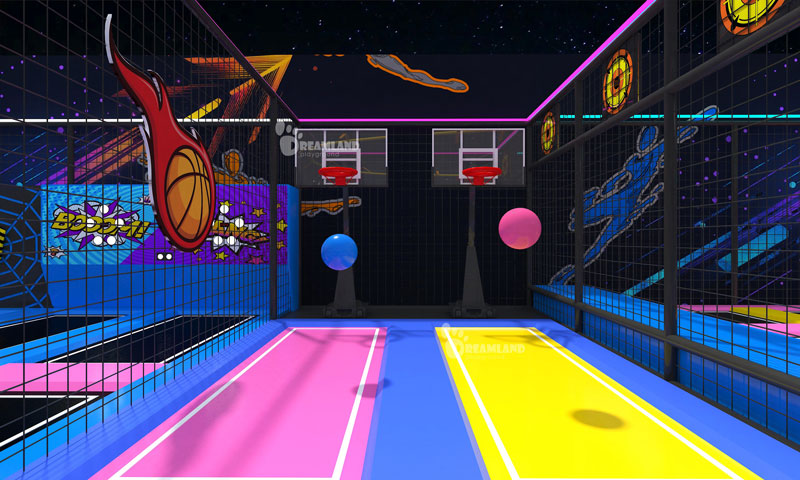
Local and State Regulations for Trampoline Parks
In this globe, all nations have their own set of rules. Here's a quick summary:
State-level regulations may alter the way that ASTM F2970 or other industry standards are used to verify trampoline safety. Each state has its own minimum safety standards, and some have set restrictions for indoor leisure areas. There may be regulations governing the number of adults who can watch youngsters.
Depending on the location, trade permit applications in different cities and neighborhoods have different costs and processing periods. While some cities restrict noise or activity, others have zoning laws that require parks to be in business districts.
Every location may have various fire and safety regulations. Fire inspections and regulations must adapt to your city's changing fire marshal standards. Generally speaking, you need to apply for a permit in order to use the trampoline where you are.
Obtain the necessary special-use permits and zoning permission. Obtain building permits and ensure that the structure complies with local regulations. Finalize sign inspections, health assessments, and fire safety checks. Maintain the required safeguards and renew licenses annually or as required.
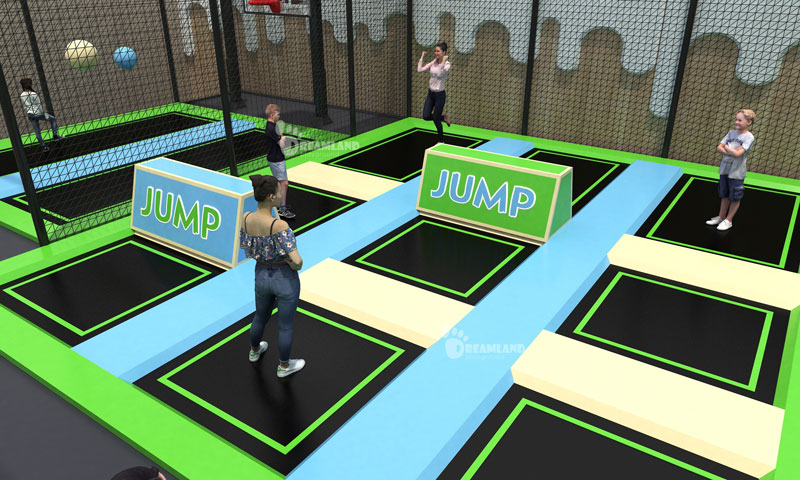
How Dreamland Playground Successfully Guides Clients to Open Trampoline Parks?
It can be intimidating to start a trampoline business, but Dreamland Playground can help. In order to get started more quickly and maintain compliance with the law, we assist clients in understanding all the permits and regulations they must abide by. Here's the method:
1. Initial Site and Zoning Assessment
We examine the location you have selected to see if it permits commercial play spaces, family entertainment centers, or indoor play. We can assist you in applying for zoning modifications or special use permits if it is prohibited. Plans' application records collaborate with auditors and city planners, examine plans, and resolve difficulties or code problems, and provide final reports and certifications that allow you to open
2. Licenses & Permits Roadmap
- Business license application
- Zoning and land‑use approvals
- Building and construction permits
- Fire, health, and signage inspection scheduling
- Insurance consultation (liability, property, workers’ comp)
3. Permits Application & Follow-Up
Permits and licenses, such as annual business licenses, health permits, and sign permissions, frequently need to be renewed. To keep your business operating efficiently, we monitor significant regulations and developments, such as modifications to trampoline safety requirements in the US.
You get more than simply permission to use Dramland Playground when you work with them. You acquire a supportive partner who ensures that your trampoline park requirements are met and that your opening date is maintained.
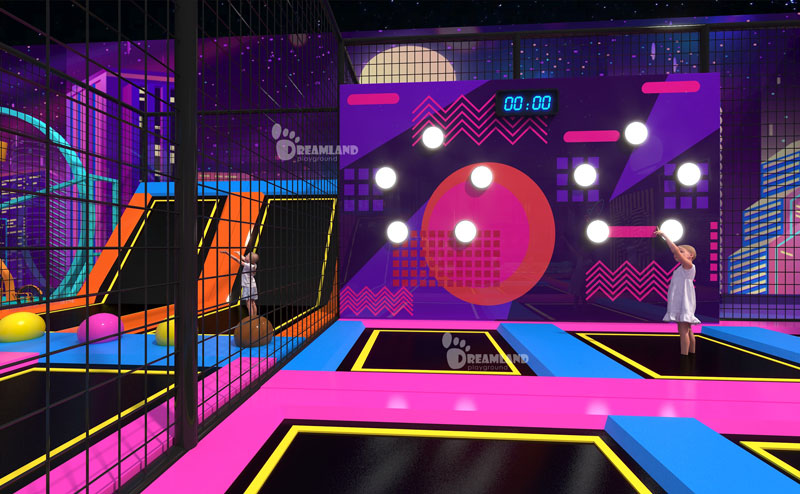
Build a Profitable Commercial Indoor Playground with Dreamland Playground
Our goal at Dreamland Playground is to safely and effectively realize your trampoline ideas. Our staff has extensive experience in the Family Entertainment Center (FEC) and indoor play area industries. We are always helping our customers from everywhere during the procedure.
This entails picking the ideal site, comprehending business permits for trampoline parks, and creating unique layouts with top-notch trampoline park equipment, climbing walls, ninja courses, and interactive play spaces.
We offer complete support, which includes assistance with zoning and permits, security rule guidance, and satisfying all trampoline park safety regulations. Our system expedites the procedure, facilitates approvals, and guarantees that your company complies with all state and local trampoline park safety regulations.
Our products comply with all global safety standards, irrespective of your location, like TUV, GS-EN1176, CE for Europe, ASTM, CPSIA, UL94, AS3533.4.2-2013 for Australia, CSA Z614-07(R2012) for Canada, NFPA701 for North America, and ISO for worldwide.
Working with Dreamland Playground entails more than just purchasing playground equipment. You are choosing a reliable partner who is dedicated to helping you succeed in the trampoline park business in the long run.
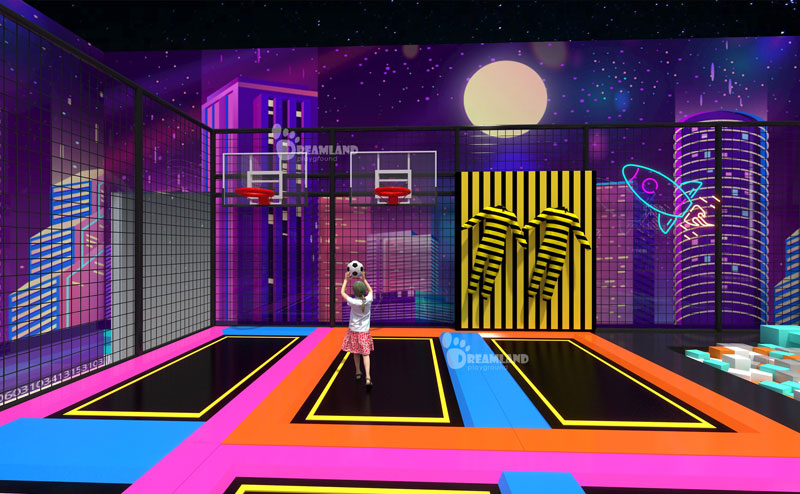
Conclusion
It takes more than just purchasing the necessary equipment to open a trampoline park. Additionally, you should consider obtaining the appropriate business licenses and permissions and keeping abreast of safety regulations. Meeting the prerequisites for running a trampoline park and obtaining insurance is crucial. Every new attraction adds new regulations and restrictions, ranging from ninja courses and climbing walls to indoor play spaces and family entertainment centers.
However, you do not have to handle your claim by yourself. Allow Dreamland Playground to help you at every stage so you can begin in a secure, law-abiding manner. Request your unique set of guidelines, timetable, and procedures to launch your ideal trampoline business. Take a chance and prepare to launch an amazing trampoline business by partnering with Dreamland Playground right now. Approach us now to get more information. Happy reading!






